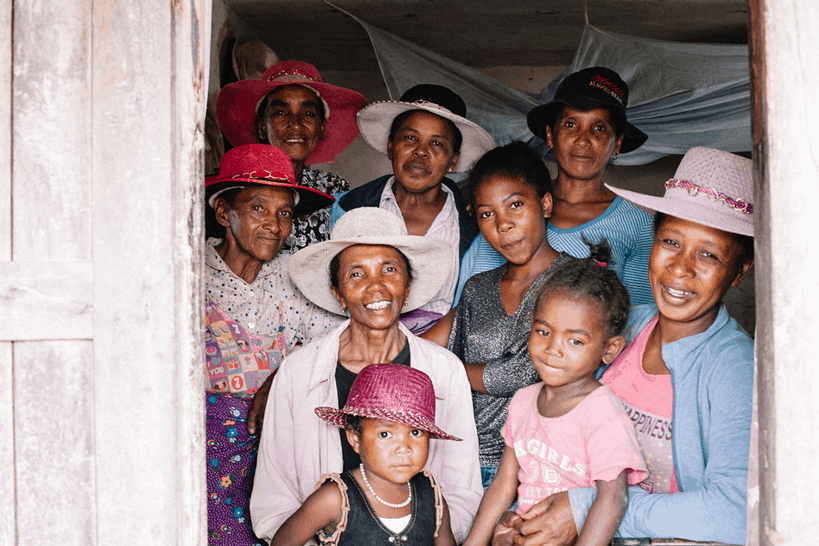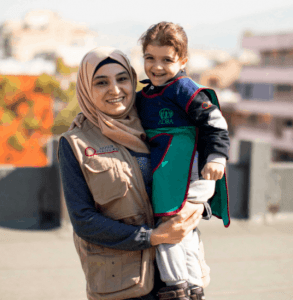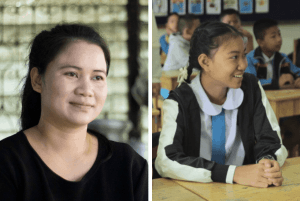A mother is not just a noun. As a verb, to mother can mean many things: to love, to teach, to provide, to heal, to listen, to sacrifice, to inspire. The list goes on.
Additionally, a mother is not just biological. In my travels with ADRA, I’ve met countless mothers—those who mother their children, yes, but also those who mother grandchildren, step-children, adopted children, or entire communities. I’ve even met women who support their local ADRA project as if it were their own child.
Today, we celebrate all those women around the world. Read below to meet some of the wonderful mothers I have had the honor to talk with.

Meet Christine a grandmother who gardens for change in central Madagascar
When ADRA technicians visited Mahasoabe, a village deep in the rolling hills of central Madagascar, they were looking for a strong mother to model positive changes for the women in the community. What they found was a devoted grandmother with a heart for service.
“The ADRA technicians came and asked if any woman was willing to be a Lead Mother, so I volunteered to become one,” said Christine, a 56-year-old mother, grandmother, and community leader. “I wanted to teach the mothers and pregnant women of my village to provide healthy diets for their children.”
As a Lead Mother, the official ADRA title assigned to role model mothers, it is Christine’s responsibility to support the women of her community. She teaches them which crops to plant and how to plant them, what foods to give to children under the age of five, and how to monitor the weight and health of a child.
The Lead Mother can see change under her own roof.
“The most meaningful thing for me is the garden. We garden every day, and we don’t have to buy everything in the market anymore,” she said. “It has changed the way I feed my grandchild. Now, I feed him a healthy and diversified diet.”
Though the little boy misses his mother, who is pursuing her career in the capital city many hours away, he is lucky to have a grandma who continues to work hard to give him the happy life he deserves.

Meet Fatima, a Syrian refugee who advocates for refugee education in Lebanon
Fatima has two children and an entire community of Syrian Refugees to care for. A refugee herself, the 31-year-old mother makes time every day to send her kids off to school, then she goes to work to convince countless refugee parents to send their kids to school, too.
As an ADRA Community Mobilizer, Fatima thinks of the whole refugee community as her family.
“When I go to family visits and I see children, they feel like my children,” she said. “The people open their hearts and their minds, because they know we are Syrians just like them. I feel what they say. I feel every word. I want to do everything I can for them.”
And what she does is immense: she points families in the direction of the ADRA Learning Center, a program that welcomes Syrian children who would otherwise be overlooked in the public-school system.
The center provides small classrooms, one-on-one tutors, language support, and a safe space with fellow Syrians. Most importantly, it gives children an opportunity to learn, instead of falling through the cracks.
“Education is very important for everyone, especially children,” Fatima said. “If we let the child learn, he or she will become a good person. When we return to Syria, we need engineers, we need doctors, we need teachers, we need people who are good for our country, who will make it better than before.”
Fatima herself is on track to give Syria a brighter future, and to inspire her children and her whole Syrian community to do the same.
“To have a good life, you have to have a goal for you and for your family,” she said. “For me, I want to learn more in everything—computer, teaching, education, taking care of my children, in cooking, as a woman, as a mother, as a student, as a worker in my job. All the time I have to know more. Maybe I don’t have the chance to continue studying, but I can make more things good for myself and for my children.”

Meet Pimja, a single mother in Thailand who has sacrificed everything to give her daughter a future.
Life for Pimja begins at 2 a.m. every day. The domestic worker rises in the middle of the night to go prepare and sell meat in the market for her employer, which she does until 2 p.m. After her 12-hour shift in the market, Pimja returns to the house of her employer—where she lives and works—to do the chores.
When the work is finished, she showers and goes to bed. Then she rises in the dead of night to start the cycle over again.
“The reason I work so hard is to have money for my daughter’s education,” she said. “Education is very important. If a woman doesn’t have an education, she will be looked down on.”
Pimja knows what it feels like to be looked down on. The young mother has been raped, forced into factory labor, and deported. Even now as a legal migrant in Thailand, Pimja earns 200 Thai Baht per day—just over six dollars for a job that requires her to wake at 2 a.m. and work 16 hours straight.
Hardest of all, Pimja had to give up care of her only child, Lamanja. The young mother knows that where she lives is not suitable for a girl. She knows she cannot give her daughter the support she needs to succeed.
“If Lamanja stays with me, I won’t have time to take care of her,” she said, her eyes filling with tears. “There would be so much difficulty in life without Keep Girls Safe. I don’t know where she would be at the moment, but life is so difficult for me, so it would probably also be difficult for her.”
For Pimja, sending her daughter away to Keep Girls Safe is a bittersweet blessing. She knows the shelter for vulnerable girls can give Lamanja what she herself cannot: a safe place to live and learn and opportunities to grow emotionally and academically.
“I wanted to be able to read and write, but I never had time to go to school,” she says. “I didn’t have any education, which is why I want my daughter to have an education.”
Lamanja is well aware of the sacrifice her mother continues to make for her.
“I know that she works very hard for me,” she said. “If I didn’t have my mother, I would not have the opportunities I have today.”